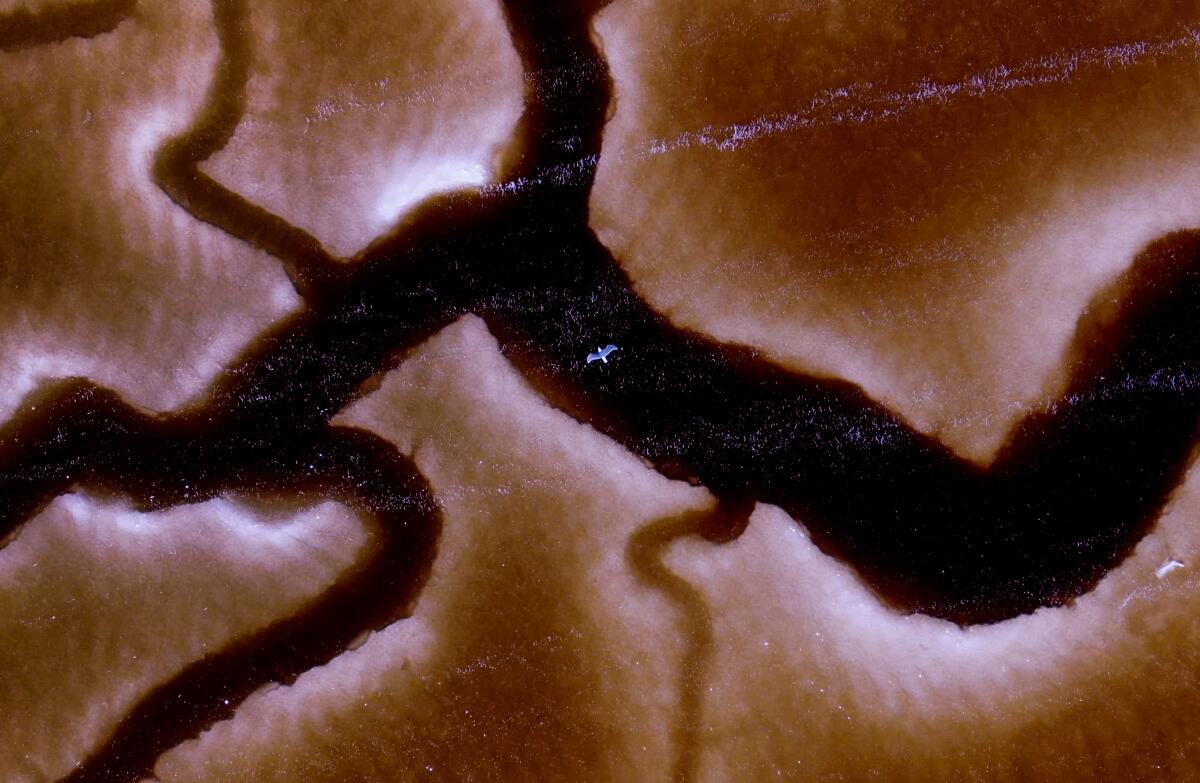Saving a marsh and town in the face of sea level rise

- Share via
Good morning, and welcome to the Essential California newsletter. It’s Wednesday, Oct. 26. I’m Rosanna Xia, an environment reporter specializing in stories about our coast and ocean. You can usually catch me geeking out about intertidal ecology or some delightfully obscure critter, and gosh do I have a story to share with you today.
For years, I would fly into San Francisco and wonder about the massive ponds of magenta and lime green water that sprawl for miles along the southern edges of the bay. The shocking hues of pinks, reds and greens are quite a sight to behold, but the story behind them surprised me even more.
[Read today’s subscriber exclusive: “Building with nature: Can reviving a marsh save this California town from sea level rise?”]
Turns out these ponds are salt mining ponds, and they used to all be coastal wetlands — a swath of tidal marsh larger than Manhattan. Early California settlers, capitalizing on native Ohlone salt-gathering practices, had diked thousands of acres of wetlands into big, shallow ponds that could then be controlled by pumps and tidal gates. The view we see from the plane today is a vivid display of how the shoreline became one of the largest salt evaporation complexes in the world.
For more than two decades, a head-spinning number of government agencies have tried to turn these salt ponds back into salt marsh. It’s the largest coastal wetland restoration west of the Mississippi and a mega example of building with nature, rather than against it, in the face of climate change. If done right, this project could ultimately save a long-neglected community and also reframe the way California adapts to sea level rise.

Reviving the forgotten marshy edges of the bay could also revive endangered wildlife such as the salt marsh harvest mouse, which exists nowhere else in the world. (Salt marshes on the West Coast, by the way, are also at risk of disappearing entirely as an ecosystem in less than a century.)
There are so many layers to this story, and I’m excited to hear your thoughts. My email is rosanna.xia@latimes.com, and you can find me on Twitter. Thank you for reading, and I hope you enjoy learning about these salt ponds as much as I enjoyed piecing together the history.
And now, here’s what’s happening across California:
Note: Some of the sites we link to may limit the number of stories you can access without subscribing.
L.A. POLITICS
Karen Bass and Rick Caruso differ on public safety and policing — but not as much as many think. Both have consistently rebuffed calls to cut the LAPD’s budget and advocated hiring more gang intervention workers — as well as investing in certain alternatives to policing, such as sending unarmed professionals to calls involving the mentally ill. And in the words of one prominent anti-police advocate, neither candidate for mayor has shown a willingness to “take on the LAPD.” Los Angeles Times
The L.A. City Council held its first in-person meeting in nearly two weeks. At Tuesday’s meeting, the council plowed through its agenda and took phone-in public comments while demonstrators shouted, chanted and jeered from the audience. Council members put in earbuds so they could hear their colleagues and the call-in testimony. Atop their to-do list: scheduling an April 4 special election to replace former Councilmember Nury Martinez, who stepped down after The Times reported on racist and derogatory remarks she made during a secretly recorded conversation with Councilmembers Gil Cedillo and Kevin De León and Ron Herrera, who was then the top official at the county Federation of Labor. Los Angeles Times
Check out "The Times" podcast for essential news and more
These days, waking up to current events can be, well, daunting. If you’re seeking a more balanced news diet, “The Times” podcast is for you. Gustavo Arellano, along with a diverse set of reporters from the award-winning L.A. Times newsroom, delivers the most interesting stories from the Los Angeles Times every Monday, Wednesday and Friday. Listen and subscribe wherever you get your podcasts.
CALIFORNIA CULTURE
Earthquakes count as California culture, and yikes, the San Jose area got a rattler. The magnitude 5.1 earthquake struck at 11:42 a.m. Tuesday in the mountains east of San Jose, followed by at least two aftershocks. Luckily, there have been no reports of injuries or damages. (Fun fact: My colleague Rong-Gong Lin II happened to be in Daly City at the time, about 50 miles northwest of the epicenter, and received an emergency alert from the MyShake earthquake early warning system seconds before the shaking began.) Los Angeles Times
Unshaken. This is a good time to plug our sister newsletter Unshaken, which gets you earthquake-ready with its six-week course. The lessons are paced so you can tackle projects week by week, including putting an earthquake kit together, assessing earthquake insurance and putting together a family plan for your household. Sign up here.
Speaking of earthquakes … homeowners in 500 California ZIP Codes can get money for earthquake retrofits. The Earthquake Brace + Bolt Program is now offering grants to residents who live in 521 “high-risk” ZIP Codes across California — an additional 126 ZIP Codes compared with last year. San Francisco Chronicle
HEALTH AND THE ENVIRONMENT
Recycled water may prove crucial for Northern California’s future resilience against droughts. The San Francisco Bay Area is way behind Southern California in reusing water — the lower half of the state, in fact, recycled 83% more water than the Bay Area last year. Boosting water recycling around the Bay Area could also have a secondary benefit: preventing algal blooms also known as red tides that threaten marine life. KQED
Another humpback whale washed ashore in Fort Bragg, the third dead whale in three months. The 31.5-foot male humpback whale washed ashore north of Pudding Creek Beach in Fort Bragg on Saturday. Volunteers spent the weekend collecting the whale’s pelvic bones for study at the California Academy of Sciences. The Mendocino Voice
Got COVID? Your symptoms may depend on your vaccination status. Researchers say COVID-19 symptoms are starting to look more and more like flu and cold symptoms, even allergies — especially if you’ve been vaccinated. Sneezing, for example, is now a very common symptom of COVID-19, reported with increasing frequency by people who’ve been vaccinated. Los Angeles Times
Support our journalism
CRIME, COURTS AND POLICING
One man was killed and another injured during a shooting early Tuesday at the Sky Hookah Lounge in the San Fernando Valley. Los Angeles Times
Suspected thieves crashed a van into a Chanel store in Beverly Grove. It was the second time in three months it had happened. Nothing was stolen this time, police said, and it’s still unclear whether this latest incident was connected to the one earlier this summer, when about $60,000 worth of merchandise was taken. Los Angeles Times
Free online games
Get our free daily crossword puzzle, sudoku, word search and arcade games in our new game center at latimes.com/games.
CALIFORNIA ALMANAC
Los Angeles: 72, sunny. San Diego: 69, patchy fog then mostly sunny. San Francisco: 66, sunny . San Jose: 67, partly sunny. Fresno: 69, sunny. Sacramento: 71, partly sunny.
AND FINALLY
Today’s California memory is from Sean Gallagher:
I was born and raised in Cambria, where my pop was an abalone diver. After they cleaned out all the abs in San Simeon, they moved to the remote San Nicolas Island, where they would stay offshore and dive for a month and get resupplied by boat. We once drove down from Cambria to meet him at L.A. Harbor in 1959, and I remember how awful the harbor water looked ... like pea soup. Disgusting even for a 10-year-old kid. Decades later, I was in L.A. for a legal conference and drove down to look at it. The water had become a deep-sea blue and was beautiful!! I could see the L.A. breakwater, and families were there fishing! Such an amazing transformation.
If you have a memory or story about the Golden State, share it with us. (Please keep your story to 100 words.)
Please let us know what we can do to make this newsletter more useful to you. Send comments to essentialcalifornia@latimes.com.
Sign up for Essential California
The most important California stories and recommendations in your inbox every morning.
You may occasionally receive promotional content from the Los Angeles Times.







